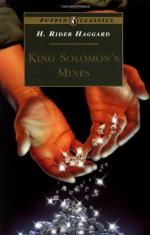“White people,” he said, “it passes in my mind to kill you. Gagool has spoken strange words. What say ye?”
I laughed. “Be careful, O king, we are not easy to slay. Thou hast seen the fate of the ox; wouldst thou be as the ox is?”
The king frowned. “It is not well to threaten a king.”
“We threaten not, we speak what is true. Try to kill us, O king, and learn.”
The great savage put his hand to his forehead and thought.
“Go in peace,” he said at length. “To-night is the great dance. Ye shall see it. Fear not that I shall set a snare for you. To-morrow I will think.”
“It is well, O king,” I answered unconcernedly, and then, accompanied by Infadoos, we rose and went back to our kraal.
CHAPTER X
THE WITCH-HUNT
On reaching our hut I motioned to Infadoos to enter with us.
“Now, Infadoos,” I said, “we would speak with thee.”
“Let my lords say on.”
“It seems to us, Infadoos, that Twala the king is a cruel man.”
“It is so, my lords. Alas! the land cries out because of his cruelties. To-night ye shall see. It is the great witch-hunt, and many will be smelt out as wizards and slain. No man’s life is safe. If the king covets a man’s cattle, or a man’s wife, or if he fears a man that he should excite a rebellion against him, then Gagool, whom ye saw, or some of the witch-finding women whom she has taught, will smell that man out as a wizard, and he will be killed. Many must die before the moon grows pale to-night. It is ever so. Perhaps I too shall be killed. As yet I have been spared because I am skilled in war, and am beloved by the soldiers; but I know not how long I have to live. The land groans at the cruelties of Twala the king; it is wearied of him and his red ways.”
“Then why is it, Infadoos, that the people do not cast him down?”
“Nay, my lords, he is the king, and if he were killed Scragga would reign in his place, and the heart of Scragga is blacker than the heart of Twala his father. If Scragga were king his yoke upon our neck would be heavier than the yoke of Twala. If Imotu had never been slain, or if Ignosi his son had lived, it might have been otherwise; but they are both dead.”
“How knowest thou that Ignosi is dead?” said a voice behind us. We looked round astonished to see who spoke. It was Umbopa.
“What meanest thou, boy?” asked Infadoos; “who told thee to speak?”
“Listen, Infadoos,” was the answer, “and I will tell thee a story. Years ago the king Imotu was killed in this country and his wife fled with the boy Ignosi. Is it not so?”
“It is so.”
“It was said that the woman and her son died upon the mountains. Is it not so?”
“It is even so.”
“Well, it came to pass that the mother and the boy Ignosi did not die. They crossed the mountains and were led by a tribe of wandering desert men across the sands beyond, till at last they came to water and grass and trees again.”




